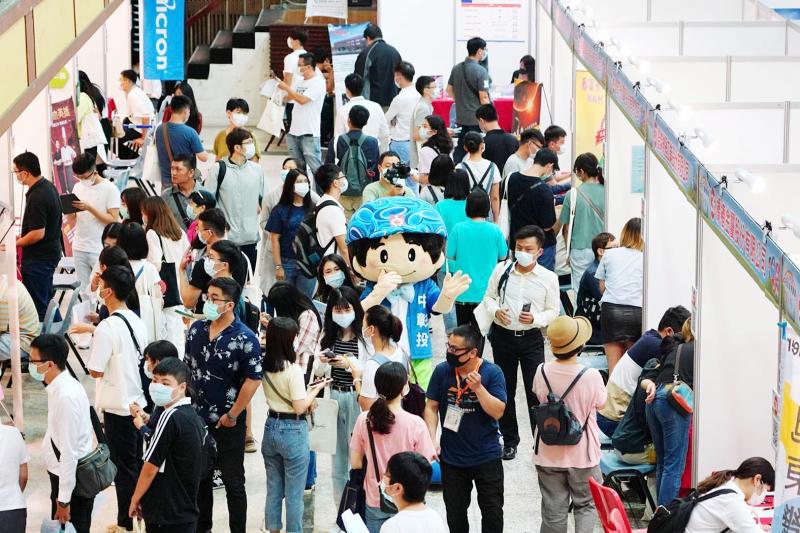Taiwan’s semiconductor industry has been aggressively recruiting talent this year, with its demand for workers in the second quarter rising more than 44 percent from a year earlier, Web site 104 Job Bank (104人力銀行) has said.
The industry is worth NT$3 trillion (US$107.9 billion).
In a white paper on the semiconductor industry’s workforce, 104 Job Bank said that Taiwan-based semiconductor companies averaged 27,701 job openings per month from April to June, the most in six-and-a-half years.

Photo: Tsai Shu-yuan, Taipei Times
That was an increase of 44.4 percent compared with the second quarter of last year and was the fourth consecutive quarter in which the figure rose.
104 Job Bank said that while the global economy has been hurt by COVID-19, Taiwan’s semiconductor industry has benefited from strong demand for emerging technologies, such as artificial intelligence, 5G applications and the Internet of Things, and continued to grow.
The booming stay-at-home economy, including the rising popularity of online learning and remote work, has also boosted demand for semiconductors, driving the need for more workers, 104 Job Bank said.
Within the semiconductor industry, the IC manufacturing sector saw the monthly average of its job openings in the second quarter grow 55.3 percent from a year earlier, it said.
This compares with 51.2 percent for the IC packaging and testing sector, and 40.8 percent for the IC design sector, it said.
IC engineers accounted for about 55 percent of the job openings advertised in the semiconductor industry per month on average, 104 Job Bank said.
Despite the growing demand, the average monthly wage in the semiconductor industry fell NT$195 (US$7), or 0.4 percent from a year earlier, to NT$52,483 in the second quarter, trailing the computer and consumer electronics industry’s NT$54,640, it said.
The IC design segment offered an average monthly wage of NT$67,834, compared with NT$56,190 in the IC manufacturing segment, and NT$47,014 in the IC packaging and testing segment.
The average pay, including bonuses, in the local semiconductor industry was NT$1.7 million, lower than the NT$2 million to NT$3.5 million seen in the US, Singapore and Japan, 104 Job Bank said.

South Korea’s equity benchmark yesterday crossed a new milestone just a month after surpassing the once-unthinkable 5,000 mark as surging global memory demand powers the country’s biggest chipmakers. The KOSPI advanced as much as 2.6 percent to a record 6,123, with Samsung Electronics Co and SK Hynix Inc each gaining more than 2 percent. With the benchmark now up 45 percent this year, South Korea’s stock market capitalization has also moved past France’s, following last month’s overtaking of Germany’s. Long overlooked by foreign funds, despite being undervalued, South Korean stocks have now emerged as clear winners in the global market. The so-called “artificial intelligence

‘SEISMIC SHIFT’: The researcher forecast there would be about 1.1 billion mobile shipments this year, down from 1.26 billion the prior year and erasing years of gains The global smartphone market is expected to contract 12.9 percent this year due to the unprecedented memorychip shortage, marking “a crisis like no other,” researcher International Data Corp (IDC) said. The new forecast, a dramatic revision down from earlier estimates, gives the latest accounting of the ongoing memory crunch that is affecting every corner of the electronics industry. The demand for advanced memory to power artificial intelligence (AI) tasks has drained global supply until well into next year and jeopardizes the business model of many smartphone makers. IDC forecast about 1.1 billion mobile shipments this year, down from 1.26 billion the prior

People stand in a Pokemon store in Tokyo on Thursday. One of the world highest-grossing franchises is celebrated its 30th anniversary yesterday.

Chinese artificial intelligence (AI) start-up DeepSeek’s (深度求索) latest AI model, set to be released as soon as next week, was trained on Nvidia Corp’s most advanced AI chip, the Blackwell, a senior official of US President Donald Trump’s administration said on Monday, in what could represent a violation of US export controls. The US believes DeepSeek will remove the technical indicators that might reveal its use of American AI chips, the official said, adding that the Blackwells are likely clustered at its data center in Inner Mongolia, an autonomous region of China. The person declined to say how the US government received